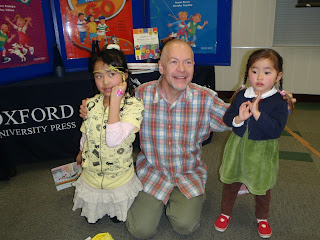 |
| Current progress |
Back in April, to coincide with the start of a new academic year here in Japan, we endeavoured on yet another project: Luna's Reading Tree. As our students develop their reading skills, we wanted a reminder within the classroom of their progress as means of evaluation for both student and teacher. Conveniently, it also adds to the decor!
As part of our reading curriculum, the Oxford Story Tree series has been a staple to many of our young learners as their first steps to reading in English and beyond. Having only become acquainted with Kipper and the gang relatively recently, I've thoroughly enjoyed their grand, and at times bizarre, adventures alongside my students.
 |
| The first step |
Part of the reason this series has been such a hit with Luna is the language progression, each story builds on the vocabulary from the previous titles to allow students to expand their vocabulary without getting heavily bogged down with too many new words. Each series also comes with an audio CD, to listen in class or at home, and a workbook focusing on the key words from the story. Both bring a great wealth of additional materials/content for children to internalize the language.
The entire series spans 7 levels, with each level represented by a different colour, while at Luna we use the first four levels: red blue, green and orange. We believe this provides enough of a platform for our students to begin discovering their own titles and genres to explore.
 |
| The secret room looking lonely |
Luna's Reading Tree represents all 28 titles, in the forms of leaves, from the 4 series, differentiated by the different colours. Each time you complete the story along with the workbook, you add a customised acorn to the relevant "leaf" to show off your accomplishments. Our goal is to have a luscious tree budding with vibrant energy, although our initial plan may not come to complete fruition as the Oxford Story Tree series are no longer available to order in Japan.
Never fear though as we still have some tricks up our sleeves and an opportunity to discover other fascinating stories to spark our students' imaginations.






